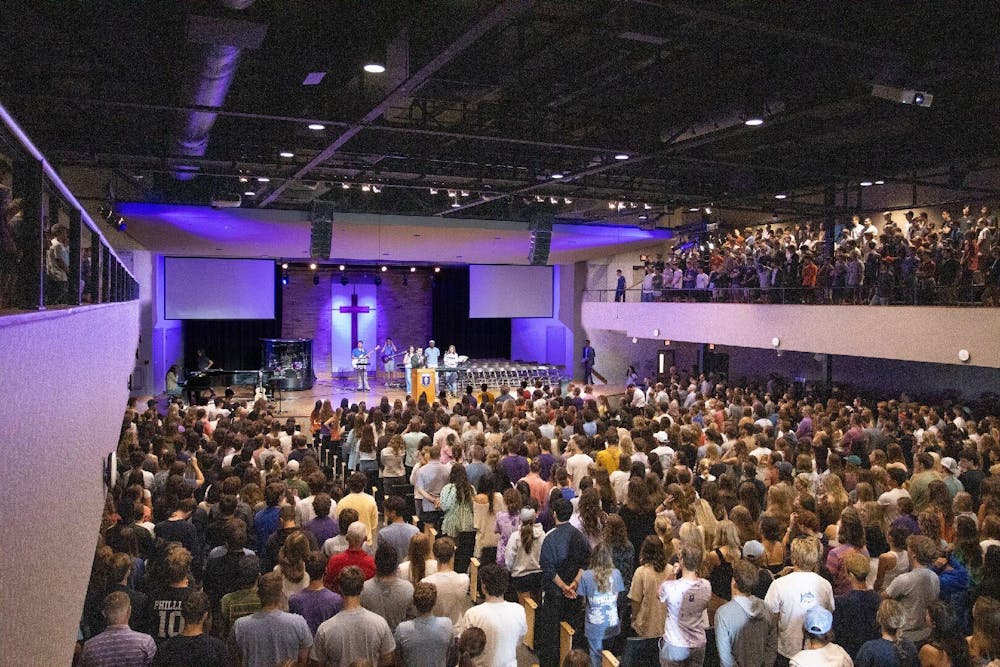“Life to the Full” doesn’t always mean living life at its most eventful.
For some, the fullest life Taylor can offer is far away from the big crowds and booming melodies of Welcome Weekend or Nostalgia Night. For those who struggle with sensory sensitivity, mental health issues or even those who wrestle with having a quiet spirit in the midst of a community dedicated to big-hearted welcomes, Taylor’s campus can be overwhelming.
Yet if we’re called to truly be intentional, we as a community have an obligation to create a sense of belonging that honors those who not only enjoy such large events, but those who find fellowship on the fringes as well.
“I think the culture is, yes, big community,” Craig Cochran, director of the Counseling Center, said, “but I think we've also created some opportunities and spaces for students to gather in smaller areas to be able to have… more of just a relaxed atmosphere where they're not feeling overstimulated.”
Cochran cited spaces such as the landing outside Rediger Auditorium, where students often gather to listen to chapel without experiencing the noise and chaos the auditorium provides. Yet there is more we as a community can do to ease the isolation or fear of missing out among those who have a hard time with crowds.
For him, it starts with respect, a value Scott Gaier, director of the Academic Enrichment Center also believes is deeply important for creating connection (AEC).
“If you just step back and look at just the big picture of Christianity, kind of (the) brushstrokes of what Christianity is all about, you go to the second greatest commandment: love your neighbor as yourself, ” Gaier said. “All of us have experienced a time in life where we haven't fit in, haven’t connected and so forth. So, being able to draw upon that and then reach out to, or be invitational to someone who may not be fitting in, I think that's a great starting point.”
Looking at the issue at Taylor as a whole, however, the idea of welcoming students in a way that meets their individual needs becomes much harder.
With more than 2,000 undergraduate students on campus, there is no such thing as one-event-fits-all, let alone an idea of a full life that works for everyone. Still, Julia Hurlow, the dean of campus life, emphasized that she and her team do what they can to create programming that helps the most students and has the least potential to harm others.
“Residence Life tries to gather as much information as available regarding what an event will entail,” Hurlow said. “This will help inform students as well as hopefully create a hospitable experience for people.”
Yet from surprise freshman events to highly-attended Taylor traditions, the start of the school year can be a difficult time for returning and new students alike. The sheer amount of social options available—wing Bible studies, pressure to join clubs or student organizations, floor dinners, worship nights, Dan’s runs, intramurals and so much more—further demonstrates the importance of showing respect.
Understanding that not everyone defines a full life in the same way is vital to living together in a healthy community. And being intentional and invitational enough to learn those differences is a worthwhile endeavor that only honors the call that our Creator places on each of our lives.
From engaging in smaller, one-on-one conversations with wing or floormates to inviting non-event goers to coffee in the place of a large community event, there are a variety of options to create space for all our students. Perhaps it’s starting a small, acoustic worship service for those who miss chapel. Perhaps it’s engaging in others’ hobbies, taking the time to appreciate the interests of those who prefer a quieter lifestyle.
We all strive to live life to the full. The events we attend—or don’t attend—don’t define that life, but call us instead to appreciate and respect the God-given differences within us. We’re called to practice the intentional community our campus proclaims, whether that community is side by side or exists further on the fringes.




